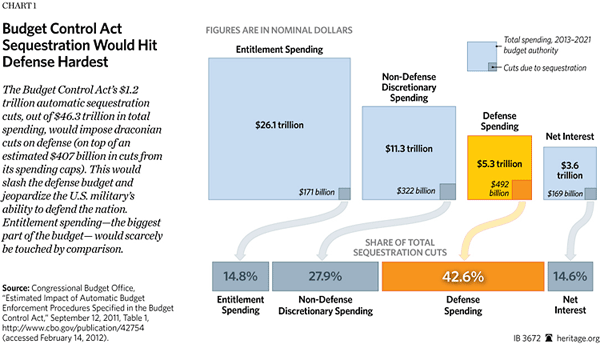The U.S. political leadership is facing a big moment. Two issues confront them in particular: looming cuts from sequestration and the looming tax hikes from Taxmageddon. Both are poised to take effect on New Year’s Day 2013. If Congress and the President do not step up now and prevent these two budget time bombs from detonating, there will be grave consequences for the nation.
Congress and the President should protect the defense readiness on which the security of America rests. To do otherwise is both irresponsible and foolish. However, it would be sheer folly to pay for it by raising taxes. Rather, Congress should undo the cuts that would strike defense and offset them with cuts elsewhere.
High Risk Cuts
The defense cuts are too big and have no rationale. At stake are nearly $500 billion in cuts from the defense portion of the sequestration (automatic cuts over 10 years from the Budget Control Act [BCA] that will hit in January 2013). These cuts are alarmingly disproportionate: 43 percent of the sequestration cuts would come from defense, though it is only 11 percent of total spending. This would mean a cut of nearly 10 percent of the already reduced defense budget. On the other hand, entitlements, which comprise over half of all federal spending and are the fastest growing part of the budget, would remain essentially untouched, receiving only 15 percent of the cuts. But this would be a reduction of less than 1 percent of all entitlement spending.
Defense sequestration cuts are even more absurd when considering the cuts to defense that have already occurred. First, since 2009, the Department of Defense has absorbed huge cuts of $400 billion (called “efficiencies”) under former Secretary of Defense Robert Gates.[1] Next, current Defense Secretary Leon Panetta acceded to the first tranche of spending cuts under the BCA of over $400 billion. Forcing another half-trillion dollars in cuts onto defense with no strategic analysis is an arbitrary disregard for the defense of the nation. Allowing this to occur would badly damage the readiness of the U.S. military and unnecessarily tempt our enemies.
To those who trumpet the “end” of the war on terrorism and somehow see the world as already pacific and safe, gutting defense seems logical. They look toward the Obama Administration’s “reset” with Russia, hands outstretched to Iran and radical non-state actors, and “leading from behind” in Libya as justification for this self-disarming. Anyone without the rose-colored glasses of this Administration looks at the same situations and sees a troubled world still filled with hostile adversaries who are actually growing in capability. Secretary Panetta himself has argued consistently that allowing sequestration cuts would have a harmful effect on national security.
Already Harming Readiness
Some argue that there is plenty of time to fix this mess before January. However, sequestration is having a tangible impact on defense readiness today. The threat of massive additional cuts has added enormous uncertainty into the entire defense enterprise. The uniformed services have been forbidden to plan for these cuts, but they expect them to be executed across the board.
Additionally, defense contractors are already making decisions on cutting costs in advance of sequestration, including laying off important workers.[2] Reductions of this magnitude will have serious effects on military readiness. Companies that build the military’s battleships, fighter jets, and body armor employ highly skilled workers. Washington cannot expect these workers to sit around until U.S. leaders decide to reinvest in military capabilities. Defense companies—and the employees whom they will have to lay off—will look elsewhere for business opportunities. Sequestration, in short, will deal a severe blow to the critical parts of the defense industrial base.
Thus, it is crucial that the sequestration cuts on the Department of Defense be prevented as soon as possible. Waiting is not an option; military readiness is at risk.
Tax Hikes Are Not the Answer
As the implications of sequestration become more clear—whether on the troops, the nation’s military readiness, or the workforce and industry that supports it—concerned Members of Congress are trying to address this self-inflicted wound. Coming up with additional cuts to offset defense is proving difficult in this highly polarized election year. So some are turning to tax hikes to pay for these offsets. Ostensibly, this is because the President has indicated that he would sign relief from the sequestration only through a “balanced” approach—in other words, with tax hikes.
The debt limit increase in the BCA was agreed to last August in exchange for spending cuts, including those from sequestration. At the time, many warned that the vague language of deficit reduction could lead to tax increases.
This approach is wrong at any time. The real budget problem is exploding spending, especially entitlement spending—not taxes. Tax revenues are low not because tax rates are low but because the economy is still reeling from the global recession and Obama’s high spending and massive regulatory policies. But tax hikes during a time of continued high unemployment and miserable economic data are utterly nonsensical.
Yet this is the President’s solution for Taxmageddon. His featured class warfare tax hikes on those earning over $250,000 would fall directly on successful small businesses and job creators and slow the economy and job creation.[3] In fact, like sequestration, the tremendous uncertainty churning over Washington policy is already clouding the economy today, a fact corroborated by a slew of economists and business leaders.[4] Put simply, even threatening to raise taxes has a harmful immediate effect on the economy. And, like the “Buffett Rule,” Obama’s tax hikes are pledged for all manner of things—from deficit reduction to paying for other spending, and now sequestration.
Lastly, raising taxes will not solve the spending problem. Only in the fantasy of Washington politics does anyone believe that revenues from tax increases will go to reduce the deficit. Outside the Beltway, Americans rightfully believe that higher taxes will go to pay for more spending. One has only to look at the myriad of new or higher taxes in Obamacare for proof.
What Should Be Done?
Congress has all the tools available today to sit down and agree on a real budget. They need no new devices to do this but only the will.
The ideal solution is for the Administration and Congress to solve the budget impasse today, as each day delayed makes it more difficult for defense suppliers and military leaders to plan ahead in a very risky world. Thus, staying within the spending cuts agreed to within the BCA means offsetting sequestration with spending cuts elsewhere.
If that cannot be done, then Congress should—now, not later—offset sequestration for just 2013 with spending cuts elsewhere. Then, the new Congress could work with the President next year to solve the remainder of the defense sequestration problem, giving them a chance to figure out how to handle longer-term budget issues.
Gambling with National Security
Like Taxmageddon and the economy, sequestration is hurting defense now. Congress and the President should protect defense—this is not negotiable, despite the wishes of some on Capitol Hill,[5] and it is not an ideological issue, as some have tried to portray it. Gambling with the readiness and security of America is not leadership; it is exactly the opposite.
Steven P. Bucci, PhD , is Senior Research Fellow for Defense and Homeland Security in the Douglas and Sarah Allison Center for Foreign Policy Studies, a division of the Kathryn and Shelby Cullom Davis Institute for International Studies, and Alison Acosta Fraser is Director of the Thomas A. Roe Institute for Economic Policy Studies at The Heritage Foundation.




